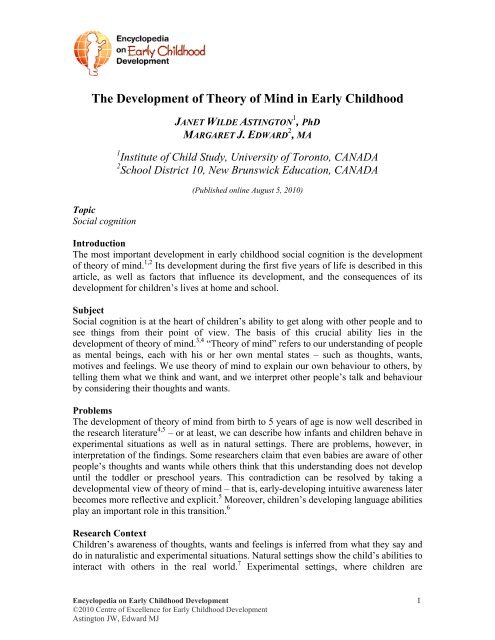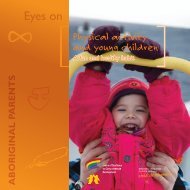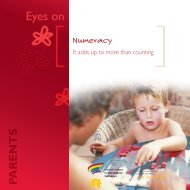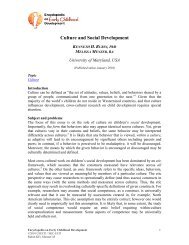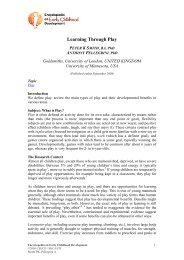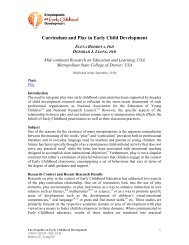The Development Of Theory Of Mind In Early - Encyclopedia on ...
The Development Of Theory Of Mind In Early - Encyclopedia on ...
The Development Of Theory Of Mind In Early - Encyclopedia on ...
You also want an ePaper? Increase the reach of your titles
YUMPU automatically turns print PDFs into web optimized ePapers that Google loves.
<str<strong>on</strong>g>The</str<strong>on</strong>g> <str<strong>on</strong>g>Development</str<strong>on</strong>g> of <str<strong>on</strong>g>The</str<strong>on</strong>g>ory of <str<strong>on</strong>g>Mind</str<strong>on</strong>g> in <str<strong>on</strong>g>Early</str<strong>on</strong>g> Childhood<br />
Topic<br />
Social cogniti<strong>on</strong><br />
JANET WILDE ASTINGTON 1 , PhD<br />
MARGARET J. EDWARD 2 , MA<br />
1 <str<strong>on</strong>g>In</str<strong>on</strong>g>stitute of Child Study, University of Tor<strong>on</strong>to, CANADA<br />
2 School District 10, New Brunswick Educati<strong>on</strong>, CANADA<br />
(Published <strong>on</strong>line August 5, 2010)<br />
<str<strong>on</strong>g>In</str<strong>on</strong>g>troducti<strong>on</strong><br />
<str<strong>on</strong>g>The</str<strong>on</strong>g> most important development in early childhood social cogniti<strong>on</strong> is the development<br />
of theory of mind. 1,2 Its development during the first five years of life is described in this<br />
article, as well as factors that influence its development, and the c<strong>on</strong>sequences of its<br />
development for children’s lives at home and school.<br />
Subject<br />
Social cogniti<strong>on</strong> is at the heart of children’s ability to get al<strong>on</strong>g with other people and to<br />
see things from their point of view. <str<strong>on</strong>g>The</str<strong>on</strong>g> basis of this crucial ability lies in the<br />
development of theory of mind. 3,4 “<str<strong>on</strong>g>The</str<strong>on</strong>g>ory of mind” refers to our understanding of people<br />
as mental beings, each with his or her own mental states – such as thoughts, wants,<br />
motives and feelings. We use theory of mind to explain our own behaviour to others, by<br />
telling them what we think and want, and we interpret other people’s talk and behaviour<br />
by c<strong>on</strong>sidering their thoughts and wants.<br />
Problems<br />
<str<strong>on</strong>g>The</str<strong>on</strong>g> development of theory of mind from birth to 5 years of age is now well described in<br />
the research literature 4,5 – or at least, we can describe how infants and children behave in<br />
experimental situati<strong>on</strong>s as well as in natural settings. <str<strong>on</strong>g>The</str<strong>on</strong>g>re are problems, however, in<br />
interpretati<strong>on</strong> of the findings. Some researchers claim that even babies are aware of other<br />
people’s thoughts and wants while others think that this understanding does not develop<br />
until the toddler or preschool years. This c<strong>on</strong>tradicti<strong>on</strong> can be resolved by taking a<br />
developmental view of theory of mind – that is, early-developing intuitive awareness later<br />
becomes more reflective and explicit. 5 Moreover, children’s developing language abilities<br />
play an important role in this transiti<strong>on</strong>. 6<br />
Research C<strong>on</strong>text<br />
Children’s awareness of thoughts, wants and feelings is inferred from what they say and<br />
do in naturalistic and experimental situati<strong>on</strong>s. Natural settings show the child’s abilities to<br />
interact with others in the real world. 7 Experimental settings, where children are<br />
<str<strong>on</strong>g>Encyclopedia</str<strong>on</strong>g> <strong>on</strong> <str<strong>on</strong>g>Early</str<strong>on</strong>g> Childhood <str<strong>on</strong>g>Development</str<strong>on</strong>g> 1<br />
©2010 Centre of Excellence for <str<strong>on</strong>g>Early</str<strong>on</strong>g> Childhood <str<strong>on</strong>g>Development</str<strong>on</strong>g><br />
Astingt<strong>on</strong> JW, Edward MJ
SOCIAL COGNITION<br />
questi<strong>on</strong>ed individually about hypothetical scenarios, reveal the precise level of a child’s<br />
independent understanding. 8<br />
Key Research Questi<strong>on</strong>s<br />
• What are the typical developments in theory of mind from infancy to age 5?<br />
• What factors, both those in the social envir<strong>on</strong>ment and those internal to the child,<br />
influence the rate of development?<br />
• What are the c<strong>on</strong>sequences of theory-of-mind development for children’s social<br />
competence and for their success in school?<br />
Recent Research Results<br />
• Research shows that infants display behaviours that are important beginnings for<br />
theory-of-mind development (see details in Moore’s and Sommerville’s papers in<br />
the chapter <strong>on</strong> social cogniti<strong>on</strong> 9,10 ).<br />
• By age 2, children clearly show awareness of the difference between thoughts in<br />
the mind and things in the world. <str<strong>on</strong>g>In</str<strong>on</strong>g> pretend play (e.g., pretending a block is a<br />
car), toddlers show that they can distinguish between an object – the block – and<br />
thoughts about the object – the block as a car. 11 <str<strong>on</strong>g>The</str<strong>on</strong>g>y also understand that people<br />
will feel happy if they get what they want and will feel sad if they do not. 12 And at<br />
this age children see that there may be a difference between what they want and<br />
what another pers<strong>on</strong> wants. 13 This developing awareness is seen in children’s<br />
language too: 2-year-olds talk about what they and others want and like and feel;<br />
when they are 3, they also talk about what people think and know. 14<br />
• A crucial development occurs around 4 years of age when children realize that<br />
thoughts in the mind may not be true. For example, children are allowed to<br />
discover that a familiar candy box actually c<strong>on</strong>tains pencils, and then are asked<br />
what their friend will think is in the box, before looking inside it. 15 Three-yearolds<br />
assume that the friend will know it has pencils inside, just as they now do,<br />
but 4-year-olds recognize that the friend will be tricked, just as they were. Threeyear-olds<br />
also do not remember that their own belief has changed. 16 If the pencils<br />
are put back in the box and they are asked what they thought was inside before<br />
opening it, they’ll say “pencils” not “candy” but 4-year-olds remember they<br />
thought it was candy. That is, 3-year-olds are not simply egocentric, i.e., thinking<br />
every<strong>on</strong>e knows what they know, rather, they come to understand their own minds<br />
and those of other people at the same time. By the age of 4 or 5 years, children<br />
realize that people talk and act <strong>on</strong> the basis of the way they think the world is,<br />
even when their thoughts do not reflect the real situati<strong>on</strong>, and so they will not be<br />
surprised if their uninformed friend looks for candy in the box they know has<br />
pencils inside.<br />
• Some factors in the social envir<strong>on</strong>ment influence the rate of typical development<br />
of theory of mind: for example, children show earlier awareness of mental states if<br />
their mothers talk about thoughts, wants and feelings, 17 and provide reas<strong>on</strong>s when<br />
correcting misbehaviour. 18 Children with brothers and/or sisters are aware of<br />
mental states so<strong>on</strong>er than <strong>on</strong>ly children. 19 <str<strong>on</strong>g>The</str<strong>on</strong>g> rate of development is also<br />
influenced by children’s participati<strong>on</strong> in pretend play, 20 their experiences of storybook<br />
reading 21 and of talking with others about past experiences. 22 Factors<br />
<str<strong>on</strong>g>Encyclopedia</str<strong>on</strong>g> <strong>on</strong> <str<strong>on</strong>g>Early</str<strong>on</strong>g> Childhood <str<strong>on</strong>g>Development</str<strong>on</strong>g> 2<br />
©2010 Centre of Excellence for <str<strong>on</strong>g>Early</str<strong>on</strong>g> Childhood <str<strong>on</strong>g>Development</str<strong>on</strong>g><br />
Astingt<strong>on</strong> JW, Edward MJ
SOCIAL COGNITION<br />
internal to the child that influence the rate of development include language<br />
abilities, 23 and cognitive abilities that c<strong>on</strong>trol and regulate behaviour (known as<br />
executive functi<strong>on</strong>s). 24<br />
• Research shows that theory-of-mind development has c<strong>on</strong>sequences for children’s<br />
social functi<strong>on</strong>ing and school success. Children with more developed theory of<br />
mind are better communicators and can resolve c<strong>on</strong>flicts with their friends; 25 their<br />
pretend play is more complex; 26 their teachers rate them as more socially<br />
competent; 27 they are happier in school and more popular with peers; 27 and their<br />
school work is more advanced in some ways. 28 However, a well-developed theory<br />
of mind can also be used in antisocial ways, such as in teasing, bullying and<br />
lying. 29<br />
Research Gaps<br />
• We need to know more about how and why different envir<strong>on</strong>mental-social and<br />
child-cognitive factors affect the rate of theory-of-mind development, particularly<br />
regarding effective interventi<strong>on</strong>s for children whose theory of mind is less welldeveloped.<br />
• To date, the majority of studies involve middle-class, Western children. More<br />
research is needed with children from different backgrounds and cultures to<br />
investigate similarities and differences in theory-of-mind development.<br />
• How people act is governed not just by their thoughts and wants, but also by<br />
moral and social rules. Research is needed into how rule-based reas<strong>on</strong>ing and<br />
theory of mind operate together in social cogniti<strong>on</strong>.<br />
• More research is also needed into the brain processes underlying theory of mind.<br />
C<strong>on</strong>clusi<strong>on</strong>s<br />
• <str<strong>on</strong>g>The</str<strong>on</strong>g>ory of mind develops gradually, with intuitive social skills appearing in<br />
infancy and then reflective social cogniti<strong>on</strong> developing during the toddler and<br />
preschool years.<br />
• Three-year-olds know that different people may want, like and feel different<br />
things. By age 4 or 5, children know that people may think different things. <str<strong>on</strong>g>The</str<strong>on</strong>g>y<br />
understand that sometimes a pers<strong>on</strong> may believe something that is not true but, in<br />
that case, what the pers<strong>on</strong> does or says is based <strong>on</strong> the false belief.<br />
• <str<strong>on</strong>g>The</str<strong>on</strong>g>re are differences in the rate of typical development that partly depend <strong>on</strong><br />
factors in the envir<strong>on</strong>ment, such as family talk and disciplinary strategies,<br />
interacti<strong>on</strong> with siblings, story books and pretend play, as well as factors in the<br />
child, such as language and cognitive c<strong>on</strong>trol abilities.<br />
• <str<strong>on</strong>g>The</str<strong>on</strong>g>re are c<strong>on</strong>sequences to theory-of-mind development that are seen in children’s<br />
social competence and success in school.<br />
Implicati<strong>on</strong>s for Parents, Services and Policy<br />
• <str<strong>on</strong>g>The</str<strong>on</strong>g>ory of mind is at the base of children’s social understanding. <str<strong>on</strong>g>The</str<strong>on</strong>g> implicit<br />
theory of mind seen in infants becomes more explicit during the preschool years<br />
and provides an important foundati<strong>on</strong> for school entry.<br />
• <str<strong>on</strong>g>The</str<strong>on</strong>g>ory of mind is more like language than literacy, in so far as it is a system with<br />
biological roots that develops without specific teaching.<br />
<str<strong>on</strong>g>Encyclopedia</str<strong>on</strong>g> <strong>on</strong> <str<strong>on</strong>g>Early</str<strong>on</strong>g> Childhood <str<strong>on</strong>g>Development</str<strong>on</strong>g> 3<br />
©2010 Centre of Excellence for <str<strong>on</strong>g>Early</str<strong>on</strong>g> Childhood <str<strong>on</strong>g>Development</str<strong>on</strong>g><br />
Astingt<strong>on</strong> JW, Edward MJ
SOCIAL COGNITION<br />
• N<strong>on</strong>etheless, envir<strong>on</strong>mental factors do influence its development. It can be<br />
enhanced by opportunities:<br />
– to engage in rich pretend play;<br />
– to talk about people’s thoughts, wants, and feelings, and the reas<strong>on</strong>s why<br />
they act the way they do;<br />
– to hear and talk about stories, especially those involving surprises, secrets,<br />
tricks, and mistakes, that invite children to see things from different points<br />
of view (for example, Red Riding Hood doesn’t know that the wolf is<br />
dressed up as grandma).<br />
• Parents and caregivers can be made aware of signs, such as lack of pretend play or<br />
lack of shared attenti<strong>on</strong> and interest, that might indicate theory of mind is not<br />
developing in the typical way, which is the case with children at risk for autism,<br />
for example. 30<br />
REFERENCES<br />
1. Flavell JH, Miller PH. Social cogniti<strong>on</strong>. <str<strong>on</strong>g>In</str<strong>on</strong>g>: Kuhn D, Siegler R, eds. Cogniti<strong>on</strong>,<br />
percepti<strong>on</strong> and language. 5th ed. New York, NY: Wiley, 1998; 851-898. Dam<strong>on</strong><br />
W, gen ed. Handbook of child psychology; vol. 2.<br />
2. Harris PL. Social cogniti<strong>on</strong>. <str<strong>on</strong>g>In</str<strong>on</strong>g>: Kuhn D, Siegler RS, eds. Cogniti<strong>on</strong>, percepti<strong>on</strong>,<br />
and language. 6th ed. Hoboken, NJ: Wiley; 2006: 811-858. Dam<strong>on</strong> W, Lerner<br />
RM, gen eds. Handbook of child psychology; vol. 2.<br />
3. Astingt<strong>on</strong> JW. <str<strong>on</strong>g>The</str<strong>on</strong>g> child’s discovery of the mind. Cambridge, MA: Harvard<br />
University Press; 1993.<br />
4. Astingt<strong>on</strong> JW, Dack LA. <str<strong>on</strong>g>The</str<strong>on</strong>g>ory of mind. <str<strong>on</strong>g>In</str<strong>on</strong>g>: Haith MM, Bens<strong>on</strong> JB, eds.<br />
<str<strong>on</strong>g>Encyclopedia</str<strong>on</strong>g> of infant and early childhood development. Vol 3. San Diego, CA:<br />
Academic Press; 2008: 343-356.<br />
5. Astingt<strong>on</strong> JW, Hughes C. <str<strong>on</strong>g>The</str<strong>on</strong>g>ory of mind: Self-reflecti<strong>on</strong> and social<br />
understanding. <str<strong>on</strong>g>In</str<strong>on</strong>g>: Zelazo PD, ed. Oxford Handbook of <str<strong>on</strong>g>Development</str<strong>on</strong>g>al<br />
Psychology. New York, NY: Oxford University Press. <str<strong>on</strong>g>In</str<strong>on</strong>g> press.<br />
6. Astingt<strong>on</strong> JW, Baird JA. Why language matters for theory of mind. New York,<br />
NY: Oxford University Press; 2005.<br />
7. Dunn J. <str<strong>on</strong>g>The</str<strong>on</strong>g> beginnings of social understanding. Cambridge, MA: Harvard<br />
University Press; 1988.<br />
8. Perner J. Understanding the representati<strong>on</strong>al mind. Cambridge, MA: Bradford<br />
Books/MIT Press; 1991.<br />
9. Moore C. Social cogniti<strong>on</strong> in infancy. <str<strong>on</strong>g>In</str<strong>on</strong>g>: Tremblay RE, Barr RG, Peters RDeV,<br />
Boivin M, eds. <str<strong>on</strong>g>Encyclopedia</str<strong>on</strong>g> <strong>on</strong> <str<strong>on</strong>g>Early</str<strong>on</strong>g> Childhood <str<strong>on</strong>g>Development</str<strong>on</strong>g> [<strong>on</strong>line].<br />
M<strong>on</strong>treal, Quebec: Centre of Excellence for <str<strong>on</strong>g>Early</str<strong>on</strong>g> Childhood <str<strong>on</strong>g>Development</str<strong>on</strong>g>;<br />
2010:1-4. Available at: http://www.childencyclopedia.com/documents/MooreANGxp.pdf.<br />
Accessed July 26, 2010.<br />
10. Sommerville JA. <str<strong>on</strong>g>In</str<strong>on</strong>g>fants’ social cognitive knowledge. <str<strong>on</strong>g>In</str<strong>on</strong>g>: Tremblay RE, Barr RG,<br />
Peters RDeV, Boivin M, eds. <str<strong>on</strong>g>Encyclopedia</str<strong>on</strong>g> <strong>on</strong> <str<strong>on</strong>g>Early</str<strong>on</strong>g> Childhood <str<strong>on</strong>g>Development</str<strong>on</strong>g><br />
[<strong>on</strong>line]. M<strong>on</strong>treal, Quebec: Centre of Excellence for <str<strong>on</strong>g>Early</str<strong>on</strong>g> Childhood<br />
<str<strong>on</strong>g>Development</str<strong>on</strong>g>; 2010:1-6. Available at: http://www.child-<br />
<str<strong>on</strong>g>Encyclopedia</str<strong>on</strong>g> <strong>on</strong> <str<strong>on</strong>g>Early</str<strong>on</strong>g> Childhood <str<strong>on</strong>g>Development</str<strong>on</strong>g> 4<br />
©2010 Centre of Excellence for <str<strong>on</strong>g>Early</str<strong>on</strong>g> Childhood <str<strong>on</strong>g>Development</str<strong>on</strong>g><br />
Astingt<strong>on</strong> JW, Edward MJ
SOCIAL COGNITION<br />
encyclopedia.com/documents/SommervilleANGxp.pdf Accessed February 8,<br />
2011.<br />
11. Kavanaugh RD. Pretend play and theory of mind. <str<strong>on</strong>g>In</str<strong>on</strong>g>: Balter L, Tamis-LeM<strong>on</strong>da<br />
CS, eds. Child psychology: A handbook of c<strong>on</strong>temporary issues. 2nd ed. New<br />
York, NY: Psychology Press, 2006; 153-166.<br />
12. Wellman HM, Banerjee M. <str<strong>on</strong>g>Mind</str<strong>on</strong>g> and emoti<strong>on</strong>: Children's understanding of the<br />
emoti<strong>on</strong>al c<strong>on</strong>sequences of beliefs and desires. British Journal of <str<strong>on</strong>g>Development</str<strong>on</strong>g>al<br />
Psychology 1991;9(2):191-214.<br />
13. Meltzoff AN, Gopnik A, Repacholi BM. Toddlers' understanding of intenti<strong>on</strong>s,<br />
desires, and emoti<strong>on</strong>s: Explorati<strong>on</strong>s of the dark ages. <str<strong>on</strong>g>In</str<strong>on</strong>g>: Zelazo PD, Astingt<strong>on</strong><br />
JW, Ols<strong>on</strong> DR, eds. Developing theories of intenti<strong>on</strong>: Social understanding and<br />
self c<strong>on</strong>trol. Mahwah, NJ: Erlbaum, 1999; 17-41.<br />
14. Bartsch K, Wellman HM. Children talk about the mind. New York, NY: Oxford<br />
University Press; 1995.<br />
15. Perner J, Leekam S, Wimmer H. Three-year-olds' difficulty with false belief: <str<strong>on</strong>g>The</str<strong>on</strong>g><br />
case for a c<strong>on</strong>ceptual deficit. British Journal of <str<strong>on</strong>g>Development</str<strong>on</strong>g>al Psychology<br />
1987;5(2):125-137.<br />
16. Gopnik A, Astingt<strong>on</strong> JW. Children's understanding of representati<strong>on</strong>al change and<br />
its relati<strong>on</strong> to the understanding of false belief and the appearance-reality<br />
distincti<strong>on</strong>. Child <str<strong>on</strong>g>Development</str<strong>on</strong>g> 1988;59(1):26-37.<br />
17. Ruffman T, Slade L, Crowe E. <str<strong>on</strong>g>The</str<strong>on</strong>g> relati<strong>on</strong> between children's and mothers'<br />
mental state language and theory-of-mind understanding. Child <str<strong>on</strong>g>Development</str<strong>on</strong>g><br />
2002;73(3):734-751.<br />
18. Ruffman T, Perner J, Parkin L. How parenting style affects false belief<br />
understanding. Social <str<strong>on</strong>g>Development</str<strong>on</strong>g> 1999;8(3):395-411.<br />
19. McAlister A, Peters<strong>on</strong> C. A l<strong>on</strong>gitudinal study of child siblings and theory of<br />
mind development. Cognitive <str<strong>on</strong>g>Development</str<strong>on</strong>g> 2007;22(2):258-270.<br />
20. Youngblade LM, Dunn J: <str<strong>on</strong>g>In</str<strong>on</strong>g>dividual differences in young children's pretend play<br />
with mother and sibling: Links to relati<strong>on</strong>ships and understanding of other<br />
people's feelings and beliefs. Child <str<strong>on</strong>g>Development</str<strong>on</strong>g> 1995;66(5):1472-1492.<br />
21. de Rosnay M, Hughes C. C<strong>on</strong>versati<strong>on</strong> and theory of mind: Do children talk their<br />
way to socio-cognitive understanding? British Journal of <str<strong>on</strong>g>Development</str<strong>on</strong>g>al<br />
Psychology 2006;24(1):7-37.<br />
22. Nels<strong>on</strong> K. Young minds in social worlds: Experience, meaning and memory.<br />
Cambridge, MA: Harvard University Press, 2007.<br />
23. Milligan KV, Astingt<strong>on</strong> JW, Dack LA. Language and theory of mind: Metaanalysis<br />
of the relati<strong>on</strong> between language and false-belief understanding. Child<br />
<str<strong>on</strong>g>Development</str<strong>on</strong>g> 2007;78(2):622-646.<br />
24. Moses LJ, Tahiroglu D. Clarifying the relati<strong>on</strong> between executive functi<strong>on</strong> and<br />
children’s theories of mind. <str<strong>on</strong>g>In</str<strong>on</strong>g>: Sokol BW, Müller U, Carpendale JIM, Young A,<br />
Iarocci G, eds. Self and social regulati<strong>on</strong>: Social interacti<strong>on</strong> and the development<br />
of social understanding and executive functi<strong>on</strong>s. New York, NY: Oxford<br />
University Press; 2010: 218-233.<br />
25. Dunn J. Children's relati<strong>on</strong>ships: Bridging the divide between cognitive and social<br />
development. Journal of Child Psychology and Psychiatry 1996;37(5):507-518.<br />
<str<strong>on</strong>g>Encyclopedia</str<strong>on</strong>g> <strong>on</strong> <str<strong>on</strong>g>Early</str<strong>on</strong>g> Childhood <str<strong>on</strong>g>Development</str<strong>on</strong>g> 5<br />
©2010 Centre of Excellence for <str<strong>on</strong>g>Early</str<strong>on</strong>g> Childhood <str<strong>on</strong>g>Development</str<strong>on</strong>g><br />
Astingt<strong>on</strong> JW, Edward MJ
SOCIAL COGNITION<br />
26. Astingt<strong>on</strong> JW, Jenkins JM. <str<strong>on</strong>g>The</str<strong>on</strong>g>ory of mind and social understanding. Cogniti<strong>on</strong><br />
and Emoti<strong>on</strong> 1995;9(2-3):151-165.<br />
27. Astingt<strong>on</strong> JW: Sometimes necessary, never sufficient: False belief understanding<br />
and social competence. <str<strong>on</strong>g>In</str<strong>on</strong>g>: Repacholi B, Slaughter V, eds. <str<strong>on</strong>g>In</str<strong>on</strong>g>dividual differences<br />
in theory of mind: Implicati<strong>on</strong>s for typical and atypical development. New York,<br />
NY: Psychology Press; 2003: 13-38.<br />
28. Astingt<strong>on</strong> JW, Pelletier J. <str<strong>on</strong>g>The</str<strong>on</strong>g>ory of mind, language, and learning in the early<br />
years: <str<strong>on</strong>g>Development</str<strong>on</strong>g>al origins of school readiness. <str<strong>on</strong>g>In</str<strong>on</strong>g>: Homer BD, Tamis-<br />
Lem<strong>on</strong>da CS, eds. <str<strong>on</strong>g>The</str<strong>on</strong>g> development of social cogniti<strong>on</strong> and communicati<strong>on</strong>.<br />
Mahwah, NJ: Erlbaum; 2005: 205-230.<br />
29. Sutt<strong>on</strong> J: ToM goes to school: Social cogniti<strong>on</strong> and social values in bullying. <str<strong>on</strong>g>In</str<strong>on</strong>g>:<br />
Repacholi B, Slaughter V, eds. <str<strong>on</strong>g>In</str<strong>on</strong>g>dividual differences in theory of mind:<br />
Implicati<strong>on</strong>s for typical and atypical development. New York: Psychology Press;<br />
2003: 99-120.<br />
30. Bar<strong>on</strong>-Cohen S, Cox A, Baird G, Swettenham J, Nightingale N, Morgan K, Drew<br />
A, Charman T. Psychological markers in the detecti<strong>on</strong> of autism in infancy in a<br />
large populati<strong>on</strong>. British Journal of Psychiatry 1996;168:158-163.<br />
To cite this document:<br />
Astingt<strong>on</strong> JW, Edward MJ. <str<strong>on</strong>g>The</str<strong>on</strong>g> development of theory of mind in early childhood. <str<strong>on</strong>g>In</str<strong>on</strong>g>: Tremblay RE, Barr<br />
RG, Peters RDeV, Boivin M, eds. <str<strong>on</strong>g>Encyclopedia</str<strong>on</strong>g> <strong>on</strong> <str<strong>on</strong>g>Early</str<strong>on</strong>g> Childhood <str<strong>on</strong>g>Development</str<strong>on</strong>g> [<strong>on</strong>line]. M<strong>on</strong>treal,<br />
Quebec: Centre of Excellence for <str<strong>on</strong>g>Early</str<strong>on</strong>g> Childhood <str<strong>on</strong>g>Development</str<strong>on</strong>g>; 2010:1-6. Available at: http://www.childencyclopedia.com/documents/Astingt<strong>on</strong>-EdwardANGxp.pdf.<br />
Accessed [insert date].<br />
Copyright © 2010<br />
This article is funded by the Centre of Excellence for <str<strong>on</strong>g>Early</str<strong>on</strong>g> Childhood <str<strong>on</strong>g>Development</str<strong>on</strong>g><br />
(CEECD), the Strategic Knowledge Cluster <strong>on</strong> ECD (SKC-ECD) and the Alberta<br />
Centre for Child, Family and Community Research.<br />
<str<strong>on</strong>g>Encyclopedia</str<strong>on</strong>g> <strong>on</strong> <str<strong>on</strong>g>Early</str<strong>on</strong>g> Childhood <str<strong>on</strong>g>Development</str<strong>on</strong>g> 6<br />
©2010 Centre of Excellence for <str<strong>on</strong>g>Early</str<strong>on</strong>g> Childhood <str<strong>on</strong>g>Development</str<strong>on</strong>g><br />
Astingt<strong>on</strong> JW, Edward MJ


